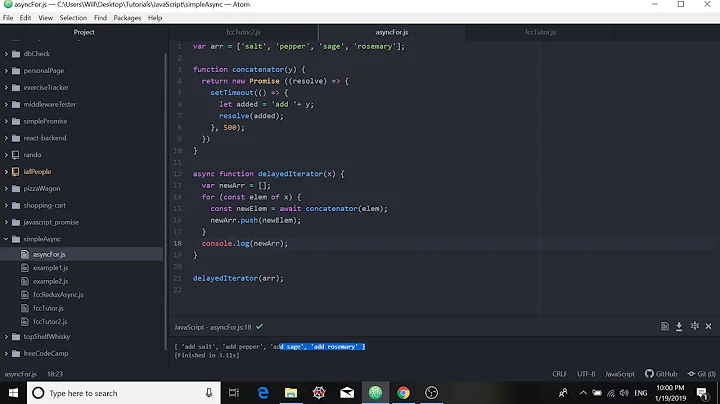Observable.forkJoin with a for loop
Solution 1
Using the for loop to make multiple HTTP requests, and then subscribe to all of them separately should be avoided in order not to have many Observable connections opened.
As @Juan Mendes mentioned, Observable.forkJoin will return an array of tasks that match the index of each process in your processes array. You can also assign tasks to each process as they arrive as follows:
getTasksForEachProcess(): Observable<any> {
let tasksObservables = this.processes.map(process, processIdx) => {
return myService.getTasks(process)
.map(tasks => {
this.processes[processIdx].tasks = tasks; // assign tasks to each process as they arrive
return tasks;
})
.catch((error: any) => {
console.error('Error loading tasks for process: ' + process, 'Error: ', error);
return Observable.of(null); // In case error occurs, we need to return Observable, so the stream can continue
});
});
return Observable.forkJoin(tasksObservables);
};
this.getTasksForEachProcess().subscribe(
tasksArray => {
console.log(tasksArray); // [[Task], [Task], [Task]];
// In case error occurred e.g. for the process at position 1,
// Output will be: [[Task], null, [Task]];
// If you want to assign tasks to each process after all calls are finished:
tasksArray.forEach((tasks, i) => this.processes[i].tasks = tasksArray[i]);
}
);
Please also take a look at this post: Send multiple asynchronous HTTP GET requests
Solution 2
Thanks to Seid Mehmedovic for great explanation but it looks like code missing one round bracket near map. For me it worked as follows:
getTasksForEachProcess(): Observable<any> {
let tasksObservables = this.processes.map((process, processIdx) => {
return myService.getTasks(process)
.map(tasks => {
this.processes[processIdx].tasks = tasks; // assign tasks to each process as they arrive
return tasks;
})
.catch((error: any) => {
console.error('Error loading tasks for process: ' + process, 'Error: ', error);
return Observable.of(null); // In case error occurs, we need to return Observable, so the stream can continue
});
});
return Observable.forkJoin(tasksObservables);
};
this.getTasksForEachProcess().subscribe(
tasksArray => {
console.log(tasksArray); // [[Task], [Task], [Task]];
// In case error occurred e.g. for the process at position 1,
// Output will be: [[Task], null, [Task]];
// If you want to assign tasks to each process after all calls are finished:
tasksArray.forEach((tasks, i) => this.processes[i].tasks = tasksArray[i]);
}
);
Related videos on Youtube
sukwonchoi
Updated on September 16, 2022Comments
-
sukwonchoi over 1 year
I am trying to populate an array in my component called
processeswhich is an array ofprocess. Eachprocessalso has a list oftasks.So currently, I am working with two api calls which are:
/processesand/process/{processId}/tasksI use
/processesto get all the processes and initially populate theprocessesarray. Then I use the process id of eachprocessto call the second API to get the tasks of that process.Currently, my code looks something like this:
this.processes.forEach((process, index) => { myService.getTasks().subscribe((tasks) => { process.tasks = tasks; }) })I understand that I can create an array of observables, and use
Observable.forkJoin()to wait for all these async calls to finish but I want to be able to define the subscribe callback function for each of the calls since I need a reference to theprocess. Any ideas on how I can go about approaching this issue?










